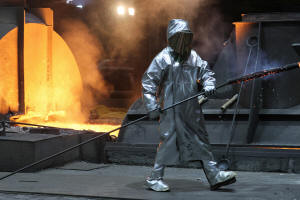|
HCOB's final euro zone manufacturing Purchasing Managers' Index
(PMI), compiled by S&P Global, fell to 43.1 in October from
September's 43.4, just above a 43.0 preliminary estimate. A
reading below 50 indicates a contraction in activity.
An index measuring output, which feeds into a composite PMI due
on Monday and seen as a good gauge of economic health, held
steady at 43.1.
"The euro zone manufacturing sector's trend over the last two
years or so looks like a bumpy sleigh ride down into the
valley," said Cyrus de la Rubia, chief economist at Hamburg
Commercial Bank.
"The stagnating new orders index, which remains deep in negative
territory, and the similar behaviour of the quantity of purchase
index does not suggest an immediate turnaround."
New orders fell for an 18th month in October and at a faster
pace with the index slipping to 39.0 from 39.2. The quantity of
purchases index was also one of the lowest in the survey's
history suggesting factories do not think they need much in the
way of raw materials.
Weakening demand came despite factories cutting their prices
again in October - the sixth straight month they have done so -
likely welcome news to policymakers at the European Central Bank
who have struggled to get inflation down to their 2% target.
Last week they left interest rates unchanged, ending a streak of
10 consecutive hikes.
Although inflation is falling fast, the euro zone economy has
begun contracting, official data showed on Tuesday.
(Reporting by Jonathan Cable; Editing by Christina Fincher)
[© 2023 Thomson Reuters. All rights
reserved.]
This material may not be published,
broadcast, rewritten or redistributed.
Thompson Reuters is solely responsible for this content.

|
|




